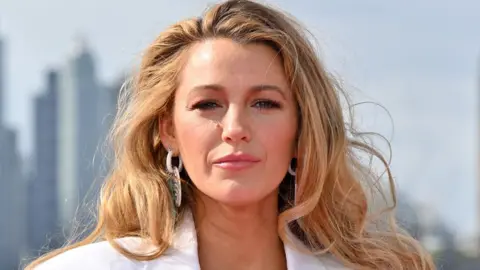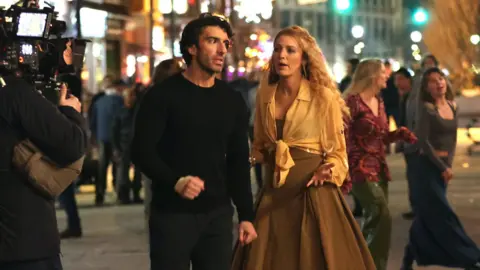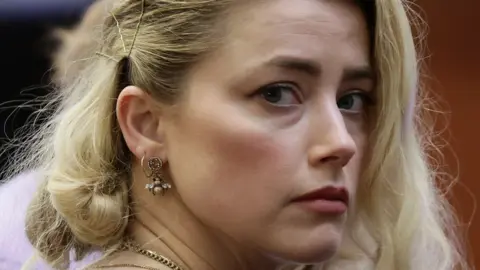 Getty Images
Getty ImagesActress Blake Lively was arguably the internet’s public enemy number one for a couple of weeks in the summer. She’s now filed an explosive legal case that she claims lifts the lid on “sinister” tactics used to harm reputations in Hollywood – and which is making people question who and what to believe.
Blake Lively had always been a pretty inoffensive kind of actress.
She had been in successful TV shows and films, like Gossip Girl and The Sisterhood of the Travelling Pants. She married fellow superstar Ryan Reynolds. She’s friends with Taylor Swift.
Then in August, while promoting her latest movie It Ends With Us, she suddenly became controversial, to the verge of being cancelled.
She was criticised for comments appearing to downplay domestic violence, the film’s theme; while awkward old interviews were resurfaced and repurposed as evidence of bullying behaviour.
Public opinion – at least among those who knew and cared – seemed to have turned against her.
Then the film came out, the furore died down, and social media moved on.
But Lively has now filed a legal case that claims she suffered sexual harassment by It Ends With Us co-star and director Justin Baldoni – and that when she complained, he and his studio Wayfarer retaliated by waging a campaign to “destroy” her reputation.
 Getty Images
Getty ImagesShe was the subject of “a sophisticated, co-ordinated, and well-financed retaliation plan” designed “to silence her”, involving a “weaponised a digital army” and fake stories being fed to “unwitting reporters”, her lawyers have alleged – and that’s why she became the focus of negative publicity.
Her lawyers have published text messages sent between Baldoni’s publicist Jennifer Abel and Melissa Nathan, a crisis communications specialist hired by his studio to help manage the harassment complaint. They appear to give a rare glimpse into conversations that are normally kept well out of the spotlight.
Nathan pitched a strategy to “start threads of theories” on social media, to “create, seed, and promote content that appeared to be authentic”, and engage in “social manipulation”, according to the legal papers.
“You know we can bury anyone,” Nathan wrote to Abel in one damning discussion.
Now, the people hired to do crisis PR for Baldoni are doing crisis PR for themselves.
Abel has said Lively’s lawyers “cherry picked” messages to include in their case without crucial context, and that there was “no ‘smear’ implemented”.
“No negative press was ever facilitated, no social combat plan, although we were prepared for it as it’s our job to be ready for any scenario.
“But we didn’t have to implement anything because the internet was doing the work for us.”
The backlash against Lively occurred naturally and didn’t need their help, Abel said.
Lawyer Bryan Freedman, representing Baldoni and his studio as well as Abel and Nathan, echoed that.
He said Baldoni hired a crisis manager due to “multiple demands and threats” allegedly made by Lively, including “threatening to not [show] up to set, threatening to not promote the film, ultimately leading to its demise during release, if her demands were not met”.
He said the plan drawn up by Nathan’s firm “proved unnecessary as audiences found Lively’s own actions, interviews and marketing during the promotional tour distasteful, and responded organically to that, which the media themselves picked up on”.
Overall, Freedman called Lively’s complaint “shameful” and full of “categorically false accusations”.
 Reuters
ReutersIn recent days, Lively has received support from a string of former co-stars and others in Hollywood.
The name of one of her supporters stands out.
Amber Heard, former wife of Johnny Depp, told NBC: “Social media is the absolute personification of the classic saying, ‘A lie travels halfway around the world before truth can get its boots on.’
“I saw this firsthand and up close. It’s as horrifying as it is destructive.”
Heard was on the receiving end of social media hostility during two high-profile libel trials involving Depp in the UK and US in 2020 and 2022. Nathan also reportedly worked for Depp.
Freedman responded to Heard by saying the only connection between her and Lively was that “for decades every move they have made has been out there for everyone to see” so the public could “make up their own minds – which they did, organically”.
Tortoise Media head of investigations Alexi Mostrous, who hosted a podcast called Who Trolled Amber? earlier this year examining the abuse she received, said there were parallels.
“In both the Blake Lively case and the Amber Heard case, you see PR companies working with digital media specialists and other ‘contractors’ to promote online stories beneficial to their wealthy clients in ways that are opaque and not well understood,” he told BBC News.
“It’s an unregulated world where all sorts of tactics can take place behind closed doors.”
‘Common tactic’
Variety said Lively’s case “lays bare a show business process that’s meant to operate in the shadows – the hiring of expensive crisis communications experts to sway opinion and uplift clients”.
Her allegations suggest a “sinister shadow campaign” that went “beyond what most publicity firms in Hollywood see as acceptable”, The Wrap’s Sharon Waxman wrote.
According to Rory Lynch, partner and head of reputation management law at Gateley Legal, it is “quite a common tactic” in Hollywood and business disputes to “have PRs on both sides planting negative stories, sometimes false stories, about the opposition”.
“Even back in the golden era of Hollywood, there were rumours that Richard Burton and Elizabeth Taylor were using PR professionals to negatively brief against each other.”
However, the PR people who worked for Baldoni and his studio “dropped the ball a little bit” by discussing tactics in texts, he told BBC News.
“It doesn’t surprise me, especially in the US and Hollywood, that you’ve got quite aggressive crisis PR people.
“But the fact that they put that in writing, I think, was possibly not the wisest thing. Normally they might do something like that over the phone.”
Lively herself is “a sophisticated operator” who will “have her own PR people working away in the background as well”, Lynch added.
‘Our eyes are open’
The New York Times, which broke the story of Lively’s complaint at the weekend, said she “denied that she or any of her representatives planted or spread negative information about Mr Baldoni or Wayfarer”.
The paper also pointed out that “it is impossible to know how much of the negative publicity” towards Lively was originally seeded by those working on behalf of Baldoni, “and how much they noticed and amplified”.
Many fans who turned against Lively now see the situation in a different light.
“We are so able to be manipulated into hating a woman that all it takes is a co-ordinated PR effort for us to switch sides against a domestic abuse victim, or a long-beloved American sweetheart,” wrote Maddy Mussen in the Standard.
“Now our eyes are open, will we be harder to fool? Or will we still want any excuse to turn on a famous woman who is suddenly, in our eyes and the eyes of the ones manipulating us, no longer worthy?”
The Guardian’s Laura Snapes wrote that she and her friends had now “looked back, horrified, on what we had said about her in recent months”.
She added: “Lively’s complaint has left my head spinning. What can you really trust?”














